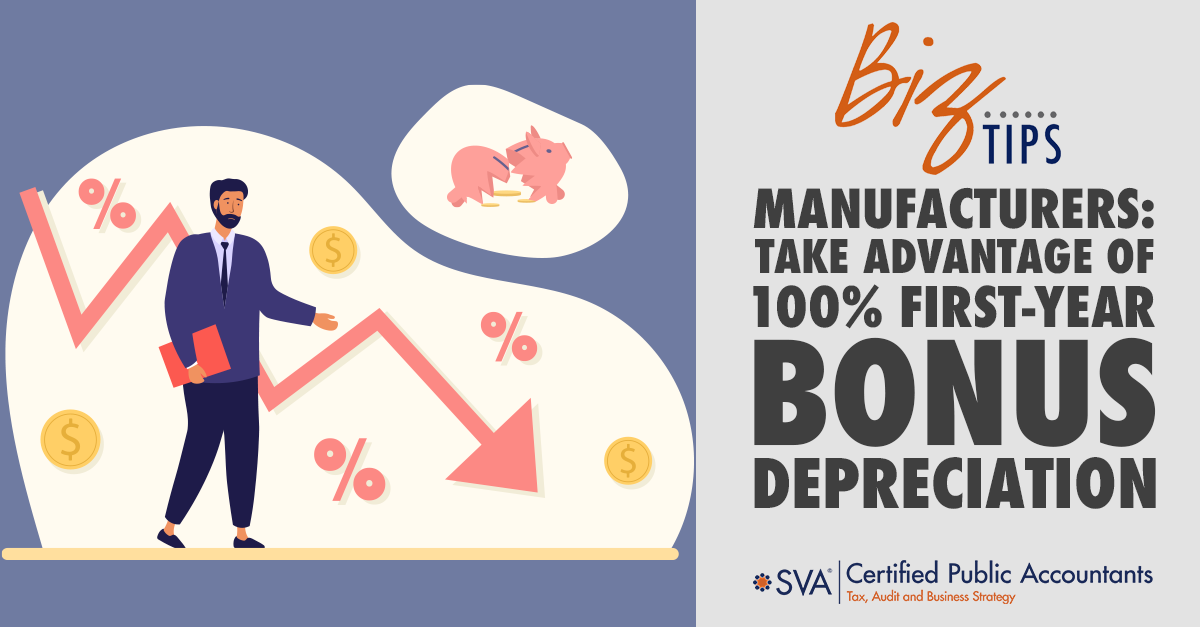(Download Video Transcript)
First-year bonus depreciation typically creates a powerful tax incentive for eligible manufacturers to purchase qualified property needed for business reasons. These tax write-offs can benefit a manufacturer’s cash flow but claiming them isn’t always the best decision.
In some cases, there are advantages to following the regular depreciation rules. However, if your manufacturing company wants to take full advantage of the bonus depreciation, this is the year to do so.
100% Deduction Currently Available
Before the Tax Cuts and Jobs Act (TCJA), a qualified business could claim a first-year bonus depreciation deduction equal to 50% of the cost of new qualified property placed in service during the tax year. The deduction was available for such property as machinery and equipment, computers, vehicles, off-the-shelf software, and office furniture. However, used property didn’t qualify for the deduction.
Effective for qualified property placed in service after September 27, 2017 and before January 1, 2023, the TCJA doubled the first-year bonus depreciation percentage to 100% of the cost.
Notably, the TCJA allows first-year bonus depreciation to also be elected for used property, as long as four requirements are met:
- The business (or a predecessor) didn’t use the property anytime before acquiring it.
- The business didn’t acquire the property from a related party (such as a subsidiary).
- The business didn’t acquire the property from a component member of a controlled group of corporations.
- The basis of the used property isn’t figured, either in whole or in part, by referring to the adjusted basis of the property in the hands of the seller or the party transferring it.
If you’re considering a business acquisition, the determination of whether to treat a transaction as a stock or asset purchase can have a significant impact on the ability to claim 100% bonus depreciation.
Phase-Out Begins Next Year
Unfortunately, the enhanced bonus depreciation tax break wasn’t designed to last forever. Under the TCJA, it’s scheduled to be gradually phased out over a five-year period as follows:
- 80% for property placed in service in 2023
- 60% for property placed in service in 2024
- 40% for property placed in service in 2025
- 20% for property placed in service in 2026
For property placed in service after 2026, bonus depreciation is scheduled to be 0%.
Thus, unless Congress takes additional action, 2022 is the last year that manufacturers can benefit from the full 100% first-year bonus depreciation. In many cases, manufacturers will be encouraged to acquire new and/or used equipment and machinery for their operations.
Bear in mind that timing is everything. Specifically, the tax benefits for first-year bonus depreciation are available based on when the qualified property is placed in service, not on when it’s acquired. This can be a critical distinction if it’ll take a significant period of time for the property to be customized or modified and installed or if the manufacturer doesn’t expect to start using the equipment or machinery right away.
The controlling date becomes even more important near the end of the year. A manufacturer may want to ensure that qualified property is placed in service before January 1, 2023 to lock in 100% bonus depreciation, as opposed to the 80% deduction.
(Download Video Transcript)
Other Factors to Consider
Finally, be aware that manufacturers shouldn’t always claim bonus depreciation. For example, if a manufacturer is organized as a pass-through entity (such as an S corporation or partnership), the bonus depreciation deduction reduces qualified business income (QBI). In turn, this lowers the amount available for the QBI deduction under Section 199A. Accordingly, in some cases, manufacturers that are entitled to the QBI deduction might be better off not claiming bonus depreciation.
Similarly, it may be advantageous for a manufacturer to skip the first-year bonus depreciation deduction in a year when it has expiring net operating loss carryovers or expiring credit carryovers that it would be unable to use if taxable income is reduced by the bonus depreciation deduction.
Also, if a manufacturer expects to move into a higher tax bracket in the near future or expects tax rates to increase, not claiming bonus depreciation might save more tax over the long term. Why? Depreciation deductions for the property will then be taken over a period of years, and tax deductions provide more savings when tax rates are higher.
Consult with Your Advisor
Keep in mind that manufacturers also might be eligible for bonus depreciation in relation to qualified improvement property (QIP). Whether involving QIP, manufacturing equipment, or other eligible assets, the decision to take a first-year bonus depreciation deduction shouldn’t be made in a vacuum.
With guidance from your tax advisor, you can coordinate the timing of property being placed in service to maximize the tax benefits of the depreciation rules for your situation.

© 2022

